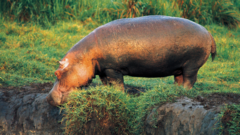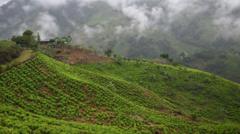Virunga National Park's recent anthrax outbreak has seen at least 50 hippos fall victim to the lethal disease. The park director reports challenges in recovery efforts, while local authorities warn residents about potential risks.
Deadly Anthrax Outbreak Claims Lives of 50 Hippos in DR Congo

Deadly Anthrax Outbreak Claims Lives of 50 Hippos in DR Congo
An anthrax outbreak in Virunga National Park has led to the tragic deaths of over 50 hippos, prompting urgent response efforts by park officials.
In an alarming development, at least 50 hippos have fallen prey to anthrax poisoning at the historic Virunga National Park in the Democratic Republic of Congo, the country's most ancient national park. Recently published photos by the park illustrate the grim sight of the lifeless animals drifting along the Ishasha River. This unfortunate occurrence came to light last week when visible evidence of the anthrax infection was first noted.
While the precise cause of the poisoning remains unidentified, laboratory tests have confirmed the presence of the anthrax bacterium, Bacillus anthracis. Park director Emmanuel De Merode has reported that efforts are underway to recover and properly dispose of the deceased animals to mitigate any potential for further contagion. However, logistical hurdles complicate these tasks significantly. "It's difficult due to lack of access and logistics," he shared with Reuters, emphasizing the challenges faced without excavators at hand. Park staff are employing caustic soda to assist in the burial process.
The Ishasha River leads northward to Lake Edward, where additional reports of dead animals have surfaced. Anthrax is primarily transmitted through spores that can lie dormant in soil for extended periods. Animals may contract the disease via inhalation or through cuts in their skin. In light of these developments, the Congolese Institute for the Conservation of Nature has issued guidance urging local residents to avoid contact with wildlife and to boil water sourced from the region prior to drinking.
Spanning an impressive 7,800 square kilometers (3,000 square miles), Virunga National Park is recognized for its remarkable biodiversity and its status as a hotspot for both conservation and danger. While it attracts tourists drawn to its unique wildlife, it is similarly fraught with security issues due to ongoing conflicts between various armed rebel factions and the Congolese military, all vying for control over the rich resources of the area. Tragically, many park rangers have lost their lives in the line of duty, dedicated to safeguarding the precious wildlife in this threatened ecosystem.
For decades, vigorous conservation efforts have been undertaken to replenish the hippo population in Virunga, which has plummeted from over 20,000 individuals to a mere few hundred, largely due to poaching and regional conflict. As the community grapples with this latest environmental crisis, the situation underscores the relentless challenges faced in preserving the region's natural heritage amidst ongoing instability.




















